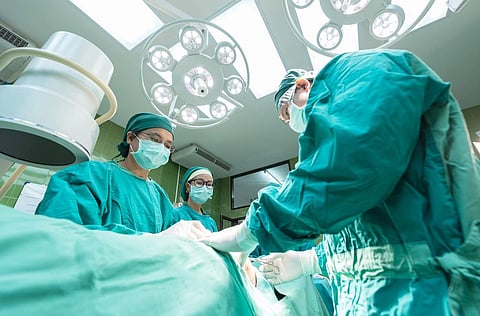

BENGALURU: More than a month after the doctors of Apollo Hospital, Bannerghatta Road performed Karnataka’s first successful intestine transplant surgery on 42-year-old Venkatesh Naik, a factory worker from Davangere, he is able to consume food and meet three-fourth of his nutritional requirements.
Venkatesh suffered from severe stomach pain nine months ago while at work. Assuming it to be a case of appendicitis his employers had him admitted to a hospital in his hometown. As the severity of the pain increased over the next day where the patient had to be strapped to his bed, the family decided to move him to a hospital in Udupi. Post several diagnostic tests it was revealed that Venkatesh suffered from a condition called Intestinal Ischemia.
Intestinal Ischemia
Acute Mesenteric Ischemia is a type of Intestinal Ischemia which usually affects the small intestine. It has an abrupt onset. In certain cases, when the individual is genetically predisposed to forming clots, this condition can be observed. It occurs due to lack of supply of oxygen-rich blood to the intestine and as a result, the cells of the intestine die. The small intestine is about six meters long in an adult. This is where 90 per cent of the digestion and absorption of food takes place.
By the time the condition Naik’s condition was diagnosed, most of the tissues of his intestines had died and begun to decay. The only option was to surgically remove the decaying intestinal tissue. The operation was successfully completed and after a short stay in the hospital, the doctors referred the patient to Apollo Hospital in Bengaluru for intestinal transplant.
WATCH VIDEO:
Surviving without an intestine
Venkatesh was put on Total Parenteral Nutrition (TPN) after the surgery in which his intestine was removed. TPN is a way of supplying all the nutritional needs of the body by bypassing the digestive system and injecting nutrient solution directly into a vein. But this procedure cannot be permanent due to its various shortcomings. TPN can cause venous thrombosis, infection, lack of independent mobility, and the fact that it costs Rs 4000 to Rs 5000 per day makes TPN a temporary option until a transplant.
“The donor for intestinal transplant is a cadaver and choosing the right organ is imperative for the success of the procedure. Since the patient was on TPN for a duration of nine months it had significantly shrunk his abdominal cavity, so choosing the right organ, procuring it at the correct time and maintaining the stability of the patient is important. There were times when we had to postpone the operation as the condition of the patient was not stable due to elevated sugar levels, fluctuating blood pressure and even infections due to the TPN,” said Dr Mahesh Gopasetty, consultant transplant surgeon, Apollo Hospitals, Bengaluru.
No stoma created
In March this year, the procedure was finally conducted without creating a stoma. A stoma is a loop of the intestine or a bag which is connected for excretion. By not creating a stoma the patient can continue his bowel movement in a normal manner without any discomfort of having to carry the bag with him always.
Father-son duo, a happy lot
“What happened to my father was unexpected, we were confused at the beginning and even post the removal of the intestine we were not sure of how his life would be. We are thankful. The doctors instilled courage in my father that he will lead a normal life again. I cannot express my joy in words now that I see him on his feet again,” said Vinay, son of Venkatesh, a class XII student. The surgery has been crowdfunded by pharma companies and donors. The typical cost of such a transplant is around Rs 20 lakh.
Post the transplant, Venkatesh has started consuming food and can perform his chores independently. “I am grateful to Dr Mahesh. The doctor and the hospital understood our financial constraints and helped us procure funds from NGOs. I would like to thank the team for their relentless service and for giving me a hope to live again,” said Venkatesh.